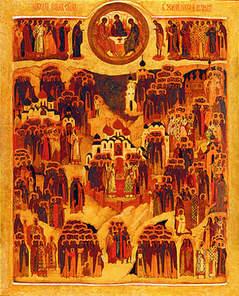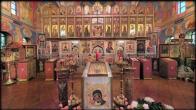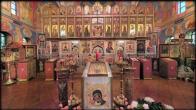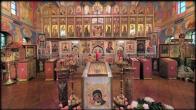You are here
ON THE SIGNS OF GOD’S CHOSEN

HOMILY ON THE SUNDAY OF ALL SAINTS
St. Ignatius (Brianchaninov)
Whosoever therefore shall confess me before men, him will I confess also before my Father which is in heaven. But whosoever shall deny me before men, him will I also deny before my Father which is in heaven. He that loveth father or mother more than me is not worthy of me: and he that loveth son or daughter more than me is not worthy of me. And he that taketh not his cross, and followeth after me, is not worthy of me. Then answered Peter and said unto him, Behold, we have forsaken all, and followed thee; what shall we have therefore? And Jesus said unto them, Verily I say unto you, That ye which have followed me, in the regeneration when the Son of man shall sit in the throne of his glory, ye also shall sit upon twelve thrones, judging the twelve tribes of Israel. And every one that hath forsaken houses, or brethren, or sisters, or father, or mother, or wife, or children, or lands, for my name's sake, shall receive an hundredfold, and shall inherit everlasting life. But many that are first shall be last; and the last shall be first. (Matthew 10:32-33, 37-38; 19:27-30)
Whosoever therefore shall confess me before men, him will I confess also before my Father which is in heaven. But whosoever shall deny me before men, him will I also deny before my Father which is in heaven (Mt. 32–33).
The Lord said this to His disciples who stood before Him then; the All-Seeing Lord, Who sees the distant future as the present, said it to all of His disciples, without exception, of all times and countries; the Lord said it also to you who stand here, in His holy temple, who have numbered yourselves amongst His disciples through holy Baptism. As lightening that flashes from one edge of the skies to the other without losing any of its brilliance, so has the Lord’s sentence reached to us through eighteen centuries, proclaimed in the Gospels in all power and clarity. The Lord’s disciples are not only those who call themselves Christians in His name, not only those who took vows of service to Him—His disciples are those who truly confess Him as their Lord, confess Him as their fully empowered Master and eternal King, following His teachings as the teachings of the Lord, fulfilling His commandments as the commandment of the Lord. Their confession must be made with mind, heart, word, deed, and their entire lives. Shame, timidity, and wavering are not tolerated in this confession.
Confession requires decisive self-denial. It must be triumphant. It must be made as if in the open arena, before all mankind, before angels, saints, and fallen angels, before the gaze of earth and heaven. For we are made a spectacle unto the world, and to angels, and to men (1 Cor. 4:9), as the Apostle Paul says of himself and the rest of the Holy Apostles. The Apostles were not ashamed or afraid to confess the God-man Who was punished with a shameful execution, sentenced by judges ecclesiastical and civil; they were not ashamed or afraid to confess before ecclesiastical and civil judges, before the powerful and wise of the earth, before tyrants and torturers, faced with torments and execution, with violent death. The holy martyrs bore such confession to the Lord; they gave the entire space of the earth their blood to drink, proclaiming to the all the earth their holy testimony of the truth of the knowledge of God and worship of God. Monastic saints confessed the Lord with unseen martyrdom and constant self-denial throughout the course of their lives: they served as a point of union between earth and heaven, between angels and men, belonging to heaven during their time on the earth, entering into communion with angels and their hosts while yet in their earthly habitations. The pleasers of God who labored in the world confessed the Lord by their disdain and complete disregard for worldly principles, and to these people the Gospel words could be justly applied: These are in the world, yet they are not of the world (Jn. 17:11, 16). Confession of the Lord joined with resolute and total denial of the world and of themselves was the sign of all the saints.
Whoever confesses the Lord during his earthly sojourn as the Lord taught, whoever proves through his own life that he precisely confesses the Lord as his Lord and God—him will the Lord confess as His disciple; He will confess His true disciples not only before the whole universe, but before God the Father. God the Son’s confession of a person before God the Father leads that person into a most intimate unity with God (cf. Jn 14:20).
When a person confesses God in a way that is pleasing to Him and as prescribed by Him, it is a sign that God has chosen that person. The fruit of a good human will is inclusion amongst the ranks of the chosen.
Weak, ambiguous confession is not accepted, it is refused as something unneeded, as something unworthy of God. It is not enough to confess secretly within the soul; it is necessary to confess with the lips and by words. Confession with words is not enough—it is necessary to confess with deeds and by life. The Lord said, Whosoever therefore shall be ashamed of me and of my words in this adulterous and sinful generation; of him also shall the Son of man be ashamed, when he cometh in the glory of his Father with the holy angels(Mk. 8:38). He must not only confess the Lord, not only acknowledge His Divinity and sovereignty; he must confess His teaching, His commandments. His commandments are confessed by fulfilling them. Fulfilling them contrary to the generally accepted customs of human society is the confession of The Lord and His words before men. Human society is called sinful and adulterous because it has mostly inclined towards sinful life; it has betrayed and traded love of God for love of sin. The customs that reign in the world, having the weight of law higher than all laws, is contrary to, at enmity with, a life that is pleasing to God. A life that is pleasing to God is an object of hatred and mockery for the proud world. In order to escape the world’s hatred, persecution, and darts, a heart that is weak and unconfirmed in faith leans toward man-pleasing, betrays the Lord’s teachings, and excludes itself from the ranks of the chosen.
The Lord confirms His disciples in faithfulness to Him and His teachings; He confirms them with threatening words and sentences, timely pronounced. Whosoever therefore shall confess me before men, him will I confess also before my Father which is in heaven. But whosoever shall deny me before men, him will I also deny before my Father which is in heaven (Mt. 10:32-33).
Dependency upon human society is not as strong as dependency upon family. It is easier to refuse to submit to the demands of society than to refuse to submit to the demands of family. Family demands are aided by the laws of nature, and when these demands are in concord with the law of God, then that very law of God aids them. The servant of Christ often finds himself perplexed by conflicting demands, not knowing which of them should be met as pleasing to God. The Lord in His foresight resolves this perplexity to complete satisfaction. He completed the above words with the following: He that loveth father or mother more than me is not worthy of me: and he that loveth son or daughter more than me is not worthy of me (Mt. 10:37). “He who prefers the will of his parents or any other relatives according to the flesh over My will, he who prefers their way of thinking and philosophy over My teaching, he who prefers to please them rather than please Me, is not worthy of Me.”
Difficulties and hindrances to confession of Christ that work against a Christian from the outside are insignificant when compared with the difficulties and hindrances that are within us. Sin which lives in the mind, heart, and body directly opposes confession of Christ, confession by fulfilling His commandments; sin stubbornly opposes this fulfillment. The most natural goodness, when damaged by sin, makes confession difficult by endeavoring to introduce and mix the confession of fallen nature into it. The confession of Christ is ruined by this mixture; it ascribes an incomplete fallenness to fallen nature, and detracts from the significance of Christ—a significance which is all-perfect, and therefore cannot tolerate such impurity. It demands firm recognition of the corruption of fallen nature.
It is possible to draw back from human society, or from relatives; but where do you go to get away from yourself? Where can you hide from your own nature? How do you escape it? In order to be freed from slavery to fallen nature, the Lord commands us to crucify our nature; that is, to deny its reason and will, to nail the mind’s activity and the heart’s attractions to the commandments of the Gospels. Thus, They that are Christ’s have crucified the flesh with the affections and lusts (Gal. 5:24): they have crucified their carnal mind and their fallen nature’s will, upon which the soul’s and body’s sinful attractions, and sinful life, are founded and built. Thus was the world crucified to the Apostle and the Apostle to the world (cf. Gal. 6:14). The holy prophet David prayed to God to be granted the strength and ability to so crucify himself: Nail down my flesh with the fear of Thee (Ps. 118:120); that is, my carnal mind and my will, so that they would remain immobilized! Establish for Thy servant Thine oracle [word] unto fear of Thee (Ps. 118:38), so that I might be steadily guided in my seen and unseen activity by Thy word. He who mortifies his fallen nature with the sword of Christ’s teaching—whosoever shall lose his life for my sake and the gospel’s, says the Lord,the same shall save it (Mk. 8:35; Mt. 10:39). On the contrary, whoever acts according to the reasoning and attractions of his fallen nature, mistakenly accepting them as good—He that findeth his life shall lose it. And he that taketh not his cross, who does not take the yoke of My commandments upon himself, and followeth not after me, in self-denial, but follows his own self, is not worthy of me (Mt. 10:38–39).
The Holy Church, intending to explain most satisfactorily the fate of God’s chosen ones in both time and eternity, has determined that after hearing the terrible, impartial, and resolute sentence from the mouth of God, we should read today the Lord’s answer to the Apostle Peter’s question: Then answered Peter and said unto him, Behold, we have forsaken all, and followed thee; what shall we have therefore? (Mt. 19:27). The Lord promised great honor to the twelve Apostles. As the God-man is the only eternal King of Israel, that is, of all Christians, the spiritual Israel—which must consist of all nations of the earth and finally inhabit the promised land, heaven—it is natural that the God-man’s Apostles, through whom all the nations came to submit to Him, should be made the leaders and judges of this new Israel, this eternal, heavenly nation. Having informed the Apostles of their significance in the state of human eternity (cf. Mt. 19:28), the Lord adds, And every one that hath forsaken houses, or brethren, or sisters, or father, or mother, or wife, or children, or lands, (Mt. 19:29) for my sake, and the gospel’s … shall receive an hundredfold now in this time, houses, and brethren, and sisters, and mothers, and children, and lands, with persecutions; and in the world to come eternal life (Mk. 10:29–30; cf. Mt. 19:29).Persecution is what earthly life is called. It is persecution[2] because humans were cast down to the earth and subjected to a sojourn of suffering upon it for transgressing God’s commandments. It is a place and time of persecution for the followers of Christ, because the prince of this world reigns there, the reign of sin is most widespread there, sin being the enemy of Christ’s followers, cruelly persecuting and oppressing them without interruption. They are subjected to the many different torments of sin both within them and from the outside. The fallen spirits who thirst for their destruction, work against them with frenzied hatred and incredible craftiness; working against them also are the majority of people, who have willingly enslaved themselves to the fallen spirits, and who serve them as blind, unhappy instruments; working against them also are their own passions and weaknesses.
The followers of Christ receive even in this temporary exile a hundred fold more than what they have forsaken for Christ’s sake and for the sake of His commandments. They tangibly receive the grace of the All-Holy Spirit. Before Divine grace brings consolation, all the joys and consolations of the world are destroyed; before spiritual riches, before spiritual glory, all the riches and glory of the world are destroyed; in the eyes of the saints, sinful and fleshly pleasures are disgusting filth, filled with deathly bitterness; the state of the rich and glorious of the world is like a whited sepulcher that is shiny on the outside, but inside full of stink and decay—those qualities inseparable from every corpse. A soul corrupted by eternal death—alienation from Christ—can be justly called a corpse.
All earthly good things and advantages abandon a person and remain on the earth, when, according to the inescapable and inexorable law of death, he leaves the earth and settles irrevocably into eternity. Divine grace, however, follows a different rule: it accompanies to regions beyond the grave that person who acquired it here. As soon as he casts his body, like chains, away from himself, the grace that was hitherto bound by flesh extends itself broadly and magnificently. It serves as a pledge and testimony for the chosen one of God. When he appears before the judgment that awaits every human being after death, and presents his testimony and pledge, grace fittingly brings him spiritual, eternal, indescribable, and boundless riches, splendor, and delight in heaven as the logical outcome. In the world to come (Mk. 10:30) he shall inherit everlasting life (Mt. 19:29), said the Lord—life so superabundant and refined, that fleshly man, who bases his thoughts about the unknown upon his knowledge of the known, cannot construct any understanding of it. May we also be vouchsafed, for precise confession of the Lord, to inherit this life prepared for all of us by the unfathomable, boundless mercy of the Lord, Who has redeemed us through Himself.
Amen.
Translated by Nun Cornelia (Rees)
PARISH LIFE
RECENT VIDEOS
Address of our Cathedral
Subscribe to our mailing list
While all the materials on this site are copyrighted, you may use them freely as long as you treat them
with respect and provide attribution on the Russian Orthodox Cathedral of St.John the Baptist of Washington DC.









